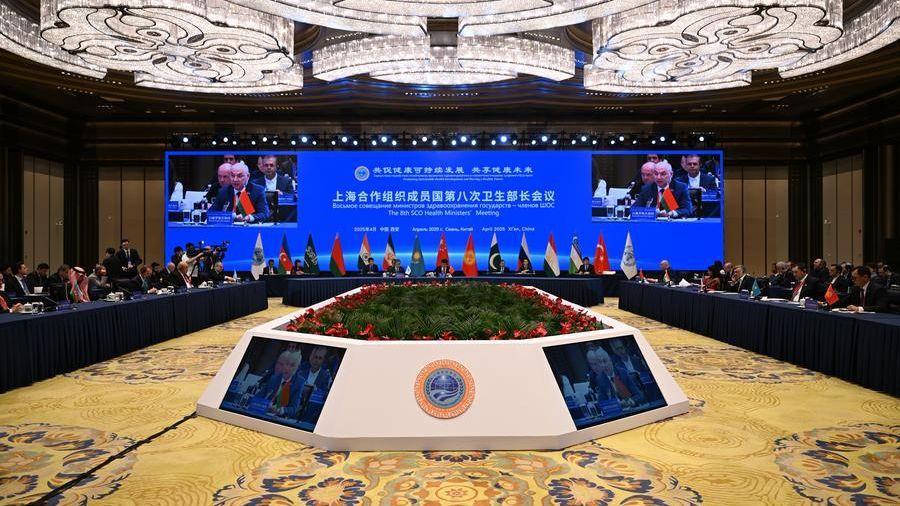The eighth Shanghai Cooperation Organization (SCO) Health Ministers' Meeting is held in Xi'an, northwest China's Shaanxi Province, April 28, 2025. (Xinhua/Zhang Bowen)
TIANJIN, Aug. 28 (Xinhua) -- Yin Jian, a specialist from north China's Tianjin Municipality, was on a busy yet rewarding mission this summer. She and her team traveled to Azerbaijan, Uzbekistan and Kazakhstan, where they worked to strengthen local defenses against cancer.
Their efforts, including educational lectures, academic exchanges and free clinic services, were part of an international project to deepen collaboration among Shanghai Cooperation Organization (SCO) member states and dialogue partners in the field of cancer prevention and treatment.
"We aim to share expertise to elevate local medical skills, boost public prevention awareness and ultimately reduce cancer rates while improving patient survival," said Yin, director of the breast reconstruction department at Tianjin Medical University Cancer Institute and Hospital.
The Chinese medical team, co-organized by the hospital and the Tianjin Anti-Cancer Association (TACA), has provided free medical consultations and screening services to nearly 700 people this summer.
Their impact was immediate and profound. In Kazakhstan, the team identified two suspected breast cancer cases.
Mary, one of the patients diagnosed with breast cancer, is planning to undergo surgery in China in September.
"The medical equipment in China is precise and the medical expertise is advanced. I trust Chinese doctors. I am confident I can recover with their help," she said.
Several cooperation agreements have been signed between Chinese medical institutions and their counterparts in these three countries, with many local doctors wishing to undergo training and patients expecting to receive treatment in China.
Hao Jihui, director general of the TACA, said wider medical cooperation is deepening ties between SCO partners. "Medical communication and cooperation truly delivered tangible benefits for people of these countries."
Established 24 years ago by China and five neighboring countries, the SCO now consists of 10 member states, two observer states and 14 dialogue partners from Asia, Europe and Africa. It has grown into a regional cooperation organization with the largest population and geographic coverage globally -- as well as the greatest development potential.
Since 2010, the SCO has successfully held eight health ministers' meetings, establishing an important platform for policy coordination, mutual learning and practical cooperation in global health through sustained dialogue and improved institutional frameworks. As an SCO member, China has proposed initiatives such as building an SCO community of health, enhancing practical health collaboration among member states.
SCO member states represent nearly half of the global population and establishing resilient and inclusive healthcare systems is essential in tackling current challenges, SCO Secretary-General Nurlan Yermekbayev said earlier this year at the eighth SCO Health Ministers' Meeting in Xi'an, northwest China's Shaanxi Province.
He added that an impressive example is a program named Lifeline Express International Sight Saving Mission, which serves as a model of practical cooperation under the SCO framework. Under this program, Chinese medical teams have provided free surgeries and trained local healthcare workers in countries including Tajikistan, Uzbekistan and Kyrgyzstan. Notably, the program will expand next year to also include Nepal.
The SCO Hospital Cooperation Alliance, which was founded in 2018 as a collaborative platform, now counts 134 hospitals among its members -- 100 from China and 34 from other SCO member states. Via events like conferences, remote exchanges, specialized collaborations and professional networking, the alliance has fostered strong partnerships in healthcare under the SCO framework.
In addition to modern medicine, traditional Chinese medicine (TCM) has also become a significant draw, attracting people from SCO partners for relevant medical training, wellness tourism and holistic care.
Since 2010, the First Teaching Hospital of Tianjin University of Traditional Chinese Medicine has offered specialized medical tourism services tailored for Russian patients. The hospital has established dedicated Russian-language support roles and delivers comprehensive medical services, ranging from initial pre-consultation to long-term follow-up.
Mineeva Galina, who runs a dental clinic in Russia, enjoyed an 18-day wellness journey in Tianjin earlier this year -- experiencing acupuncture and eating herbal soups.
"I'm deeply attracted by the charm of TCM culture. This journey opened my eyes," said Galina.
Lei Haichao, head of China's National Health Commission, said SCO member countries have achieved practical results in terms of infectious disease prevention and control, health emergencies, traditional medicine, blindness prevention, and maternal and child health in recent years, thereby demonstrating both the "Shanghai Spirit" philosophy and vitality in health cooperation.




 A single purchase
A single purchase









